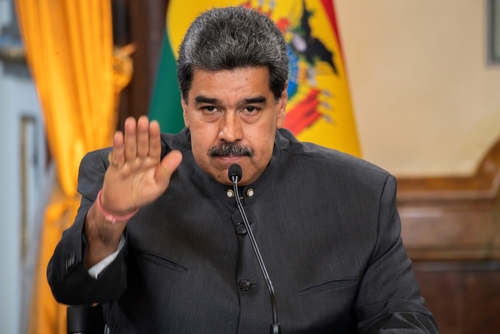In a significant diplomatic development, the Biden administration has reportedly extended an offer of amnesty to Venezuelan President Nicolás Maduro, provided he agrees to step down and facilitate a peaceful transition of power in the crisis-ridden country. This proposal, conducted through secret negotiations, comes amid heightened tensions following a disputed election that has plunged Venezuela into further political turmoil.
The clandestine talks, first reported by The Wall Street Journal, reveal that the United States is seeking to avoid a protracted conflict in Venezuela by offering a face-saving exit for Maduro and his top officials. According to the reports, the negotiations were initiated by Jorge Rodríguez, the president of the Venezuelan National Assembly, and Daniel P. Erikson of the White House National Security Council, who engaged in discussions remotely without in-person meetings.
🟥URGENTE l El dictador Nicolás Maduro cada vez más solo. La tropa abandona al genocida y se pone del lado del pueblo libre de Venezuela. Sus días están contados. Todos a las calles con Corina y Edmundo. ¿Estás firme con los patriotas? 👌🔄 pic.twitter.com/e52bg8u4ZE
— Reacción Nacional (@RNacional_News) August 12, 2024
The U.S. proposal is not the first time that Maduro has been offered amnesty in exchange for relinquishing power. However, the Venezuelan leader has consistently rejected such offers, determined to maintain his grip on the nation despite mounting international pressure and internal unrest. The Biden administration's renewed offer aligns with the strategy of the Venezuelan opposition, which is led by María Corina Machado and Edmundo González. They have advocated for negotiations that would include guarantees for the current regime's leaders, ensuring a peaceful transition to a new government.
Maduro's resistance to stepping down comes in the wake of the controversial July 28 election, where the opposition claimed a resounding victory. According to opposition figures, their candidate González won by a substantial margin, securing 7.3 million votes to Maduro's 3.3 million. The opposition's success was documented through meticulous preparation, which involved training tens of thousands of poll watchers to collect and disseminate vote tallies. Despite these efforts, the Maduro regime has refused to recognize the results, with National Electoral Council President Elvis Amoroso, a Maduro ally, declaring the incumbent the winner without providing any supporting evidence.
🟥URGENTE l Nueva advertencia de Anonymous al tirano de Maduro y los chavistas. Van a revelar y vaciar todas sus cuentas bancarias en paraísos fiscales y en otras dictaduras. El socialismo llega a su fin en Venezuela ¿Apoyas esto? 🔄🔥 pic.twitter.com/i9YMO61uNp
— Reacción Nacional (@RNacional_News) August 10, 2024
In response to the opposition's claims, Maduro's government has cracked down on dissent, arresting over 2,400 protesters and dissidents.
Human rights organizations have reported the deaths of at least 24 people during the unrest, while many antigovernment activists have fled the country or had their passports annulled. Maduro, who has labeled the opposition's actions as a coup attempt, has vowed not to forgive those who oppose his rule, even going so far as to announce the construction of new prisons for political prisoners.
The U.S. offer of amnesty, though potentially a pivotal moment in the Venezuelan crisis, is fraught with risks. Analysts suggest that if the U.S.'s efforts to broker a peaceful transition fail, it could backfire, particularly in an election year where Republicans might use the situation to criticize the Biden administration's foreign policy. The stakes are high, as the U.S. attempt to engage with Maduro comes against the backdrop of a deeply divided Venezuelan society and a regime that has shown little inclination to cede power voluntarily.
Despite the uncertainties, the Biden administration appears committed to exploring diplomatic solutions to the Venezuelan crisis. This strategy is in stark contrast to the previous administration's approach, which favored more aggressive tactics, including sanctions and support for opposition leader Juan Guaidó. Whether this new approach will succeed in bringing about a peaceful resolution in Venezuela remains to be seen, but it underscores the ongoing complexities of U.S. foreign policy in the region.




